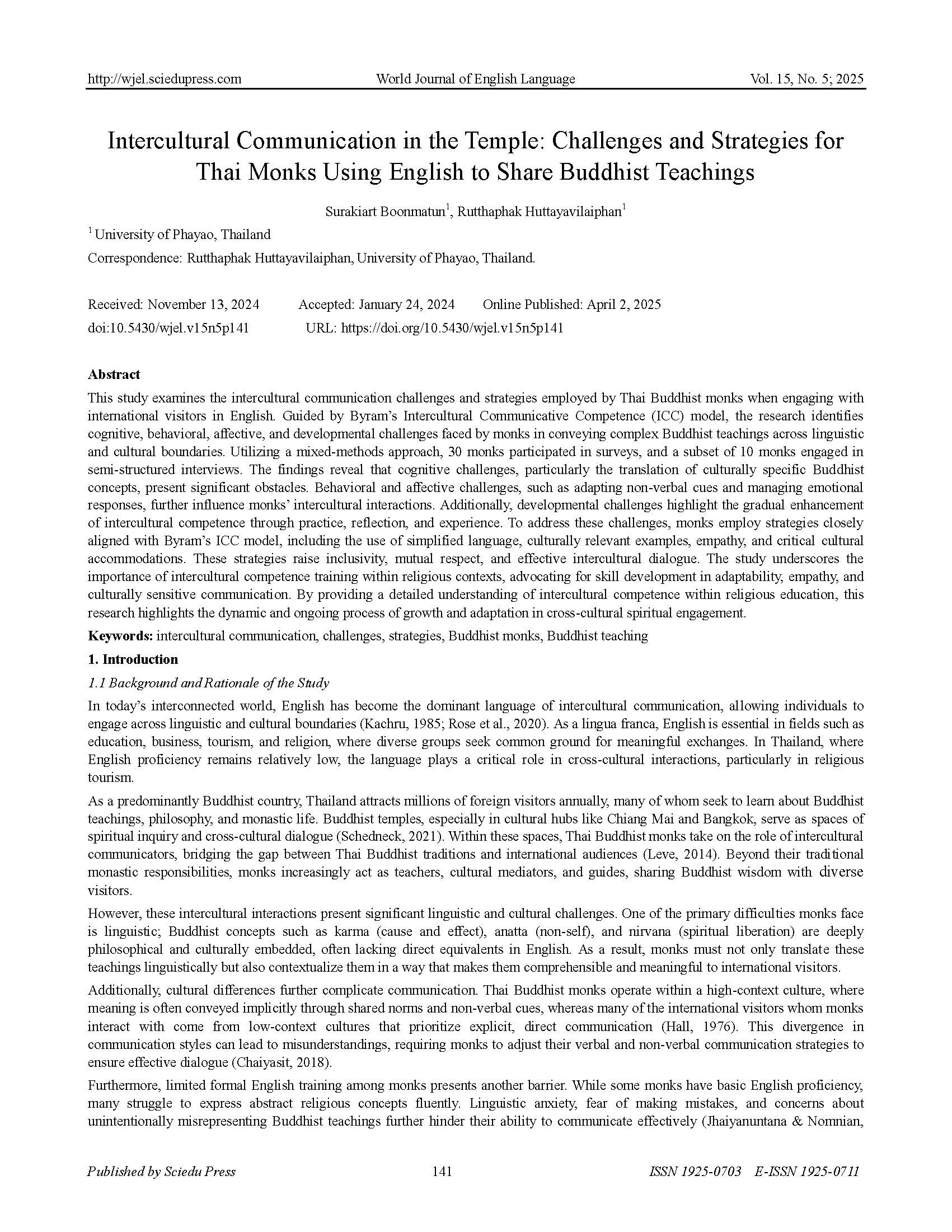Intercultural Communication in the Temple: Challenges and Strategies for Thai Monks Using English to Share Buddhist Teachings

Intercultural Communication in the Temple: Challenges and Strategies for Thai Monks Using English to Share Buddhist Teachings
โดย : kittipon.ja / 6 ส.ค. 2025 / อ่าน 85This study examines the intercultural communication challenges and strategies employed by Thai Buddhist monks when engaging w
ith
international visitors in English. Guided by Byram’s Intercultural Communicative Competence (ICC) model, the research identifies
cognitive, behavioral, affective, and developmental challenges faced by monks in conveying complex Buddhist teachings across linguistic
and cultural boundaries. Utilizing a mixed methods approa ch, 30 monks participated in surveys, and a subset of 10 monks engaged in
semi structured interviews. The findings reveal that cognitive challenges, particularly the translation of culturally specific Bud dhist
concepts, present significant obstacles. Behav ioral and affective challenges, such as adapting non verbal cues and managing emotional
responses, further influence monks’ intercultural interactions. Additionally, developmental challenges highlight the gradual enhancement
of intercultural competence thr ough practice, reflection, and experience. To address these challenges, monks employ strategies closely
aligned with Byram’s ICC model, including the use of simplified language, culturally relevant examples, empathy, and critical cultural
accommodations. T hese strategies raise inclusivity, mutual respect, and effective intercultural dialogue. The study underscores the
importance of intercultural competence training within religious contexts, advocating for skill development in adaptability, empathy, and
cul turally sensitive communication. By providing a detailed understanding of intercultural competence within religious education , this
research highlights the dynamic and ongoing process of growth and adaptation in cross cultural spiritual engagement.
ith
international visitors in English. Guided by Byram’s Intercultural Communicative Competence (ICC) model, the research identifies
cognitive, behavioral, affective, and developmental challenges faced by monks in conveying complex Buddhist teachings across linguistic
and cultural boundaries. Utilizing a mixed methods approa ch, 30 monks participated in surveys, and a subset of 10 monks engaged in
semi structured interviews. The findings reveal that cognitive challenges, particularly the translation of culturally specific Bud dhist
concepts, present significant obstacles. Behav ioral and affective challenges, such as adapting non verbal cues and managing emotional
responses, further influence monks’ intercultural interactions. Additionally, developmental challenges highlight the gradual enhancement
of intercultural competence thr ough practice, reflection, and experience. To address these challenges, monks employ strategies closely
aligned with Byram’s ICC model, including the use of simplified language, culturally relevant examples, empathy, and critical cultural
accommodations. T hese strategies raise inclusivity, mutual respect, and effective intercultural dialogue. The study underscores the
importance of intercultural competence training within religious contexts, advocating for skill development in adaptability, empathy, and
cul turally sensitive communication. By providing a detailed understanding of intercultural competence within religious education , this
research highlights the dynamic and ongoing process of growth and adaptation in cross cultural spiritual engagement.
